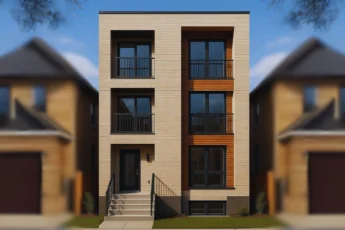DIY multiplex conversion Toronto: Converting a Toronto house into multiple rental units is never cheap, but many owners assume they can at least keep costs under control by managing the project themselves. After all, the City advertises 10- and 15-business-day targets for house-class and small-building permit reviews—how long could approvals really take? The fine print: those targets apply only after a complete, variance-free application lands on a reviewer’s desk. One zoning surprise, a missed fire-separation note, or an unplanned parking variance and the clock resets—turning a quick sign-off into three, six, even nine months of back-and-forth. While drawings ping-pong between consultants and City staff, your future apartments sit empty. That’s rent you’ll never recoup, plus mortgage, taxes, and utilities you still have to cover. Fragmented planning doesn’t just delay construction; it starves your cash flow—and that hidden cost is where most Toronto multiplex DIY conversions bleed money.
Still think the risk is overblown? Picture this: you hire an architect for drawings, a GC for the build, and—once construction is nearly done—a leasing agent to find tenants. If even one drawing misses a code detail, the permit bounces back for corrections and no one is accountable for the overall timeline. Construction pros warn that when trades overlap without a single coordinator, “tasks may be missed, duplicated, or executed poorly, leading to inefficiencies and added costs.” Contractors, meanwhile, stay laser-focused on their scope, not on your rent-start date. As one architecture blog puts it, “contractors often prioritize their own schedules over the project’s overall timeline, creating delays and disruptions.” What felt more manageable up front quickly morphs into miscommunication, finger-pointing, and expensive rework—precisely where many DIY multiplex conversion Toronto projects derail.
- Permit Pitfalls. Toronto’s permitting process is complex. One design firm notes common delays from “incomplete applications or discrepancies” and zoning issues (setbacks, height limits) that must be fixed before approvals come through. Every time city hall sends back revisions, construction grinds to a halt. Multiplex permit delays can add months in a project timeline.
- Accountability Gaps. Juggling separate architects, engineers, and contractors means no single account-holder. If something goes wrong – say the plumbing doesn’t match the electrical plan – who fixes it? As one blog summarizes, multi-contractor projects create “overlapping duties” and no central oversight, causing small mistakes to escalate into big problems.
- Lost Rent. Every week your units sit empty is money you’ll never get back. An industry insider lays it out bluntly: delays mean you’re “wasting time and money – you’re losing rent,” which can threaten covering your own carrying costs. In one lease deal, months-long material backorders left a retailer waiting – and the landlord already out the fees to expedite, yet still collecting zero rent until construction finished.
- Wrong Focus. Most home builders and renovation contractors design for owner lifestyle, not for renters’ needs or cash flow. Competitors may market a “beautiful duplex” that blends into the neighborhood, but they seldom talk about vacancy rates or ROI. By contrast, LandLord Renovations’ strongly focus on maximizing rental income from that duplex. DIY/standard remodels often skimp on tenant-friendly features (laundry capacity, storage, durable finishes), because the homeowner’s taste took priority over smart rental design.
- Quality Issues & Maintenance. Saving on materials can backfire. Cheap paint, carpet and cabinets look nice but often wear out quickly in a rental. Experts advise “smart design” choices – e.g. wider hallways, neutral walls, scratch-resistant paint – that “minimize turnover costs and increase ROI”. Avoiding durable finishes leads to repairs (and vacant weeks) that eat into your profits. For example, one landlord guide urges avoiding carpet – “durable floors” like tile or engineered hardwood “can last for decades” in a rental. Cutting corners here usually means paying for replacements (and vacancy) later.
- Coordination Headaches. Finally, think about all the loose threads: Who’s tracking the construction schedule? Who’s booking inspections? Who’s lining up renters the day the project ends? With separate vendors, the homeowner often ends up playing project manager – and headaches mount. (One construction manager quips that the latest project management software can’t fix a team that’s out of sync.)
These pitfalls add up. You may think you’re saving money by DIY-ing or hiring piecemeal, but in practice delays and mistakes usually cost far more in lost rent and added fees.
The LandLord Renovations Difference
An All-in-One Stop Shop
LandLord Renovations flips the script. We act as your single partner for the entire journey – from initial idea to fully leased units. In our own words, we “handle everything from the initial design to construction” under one unified plan. That means one schedule, one set of drawings, and one accountable team. You never have to chase different vendors or blame one another when issues come up.
Investor-First Approach
Importantly, LandLord was built around investor needs, not just looks. We start with the numbers: before hammer hits nail, we run ROI projections and rent forecasts to make sure your multiplex design makes financial sense. We know from decades of property management what tenants really want. In fact, our site boasts “over 30 years of experience screening and managing thousands of tenants yearly,” giving us insight into rental preferences. That deep expertise shapes every decision: we pick layouts, finishes and amenities based on tenant demand and longevity, so your units fill fast and last longer. As one design guide observes, minor tweaks (like scratch-resistant paint or roomy halls) can significantly reduce turnover costs and boost income – and LandLord makes those tweaks by default.
We also take care of permits and approvals in-house. LandLord’s architects and planners know Toronto bylaws backward and forward, so your filings are complete and compliant upfront. If the city raises a question, we handle it – unlike a disjointed team that might pass the buck. And once construction wraps up, our in-house leasing and management teams step in right away. We market your new units early, find qualified tenants, and even manage maintenance, ensuring minimal downtime and a well-maintained investment. In short, our clients get move-in-ready rentals that start paying for themselves immediately.
- Single Point of Contact. One contract, one timeline. LandLord coordinates architects, expeditors, builders and realtors so you don’t have to. You deal with our project manager who keeps everything on track.
- Investor-First Design. Every floorplan and fixture choice is made with tenants (and ROI) in mind. We emphasize durable, easy-care materials (the kind that “yield higher returns” over time), smart layouts, and must-have appliances.
- Streamlined Permitting. Our team prepares thorough applications to avoid the “incomplete” pitfalls so common in DIY multiplex conversion Toronto filings. We’ve built relationships with local inspectors and even pre-flag potential zoning issues, cutting weeks out of the approval process.
- Faster Lease-Up. Because leasing and construction are coordinated under one roof, marketing can begin as soon as each suite is photo-ready—speeding up the lease-up period and filling vacancies sooner.
- Long-Term Care. After your multiplex is up and running, we don’t drop the ball. LandLord offers full property management, so you don’t have to scramble for help with repairs, tenant screening or bookkeeping.
In short, LandLord delivers the complete, investor-centric solution missing from most conversions. Industry analyses note that the Toronto multiplex market is “fragmented,” with few firms offering true end-to-end service. LandLord’s decades-long track record and integrated model create a unique advantage – we combine the creative design and permitting knowledge of architects with hands-on construction execution, all under one roof. By leveraging our specialized focus and 30+ years in rentals, we streamline your project and protect your bottom line at every stage.
Building for Tenants: Reducing Vacancy with Smart Design
Every detail matters in a rental conversion. Will that new kitchen last through tenancies? Is there space for laundry in every unit? LandLord’s tenant-first philosophy answers questions like these before they become problems. For example, instead of trendy carpet that wears out quickly, we’ll install engineered hardwood or tile – finishes that “last for decades” in a rental. We ensure each unit has the right number of bathrooms, parking or storage to suit renters. The result? Units that attract and keep good tenants. Studies show these choices pay off: minimizing turnover and vacancy dramatically increases ROI.
Because we manage thousands of units, LandLord knows which features matter in Toronto’s market. We often advise clients on upgrades – like adding second washrooms or an extra bedroom – that may not suit an owner’s personal needs but drastically improve rental income. The proof is in the returns: clients consistently report shorter vacancy periods and higher rents than they expected. One former homeowner turned investor noted that by following LandLord’s recommendations, each unit was leased immediately on move-in day – a stark contrast to the months-long wait they feared under a DIY multiplex conversion Toronto plan.
Bottom Line: Don’t Gamble with Your Rental Income with Toronto multiplex DIY
Going it alone or chopping up your project among strangers might look cheaper, but the cost of missteps is steep. Every error or delay directly cuts into your profit. As one industry expert bluntly observed about delays in landlord-tenant deals, “everyone is impacted” and no one walks away unscathed – especially not the landlord left footing the bill for empty months. LandLord’s integrated, experienced team is dedicated to protecting you from those losses.
Still not convinced? Remember: a market study confirms that very few firms deliver the complete, investor-focused solution we offer. Why risk losing rent, battling permits, and navigating multiple vendors on your own, when we can handle it seamlessly?
If you’re serious about turning your home into a profitable multiplex, let’s talk. Book a 15-minute discovery call with our LandLord experts today. In just a short chat, we’ll show you how an end-to-end, investor-first approach can keep your project on schedule, fully leased, and truly profitable – from Day One.



